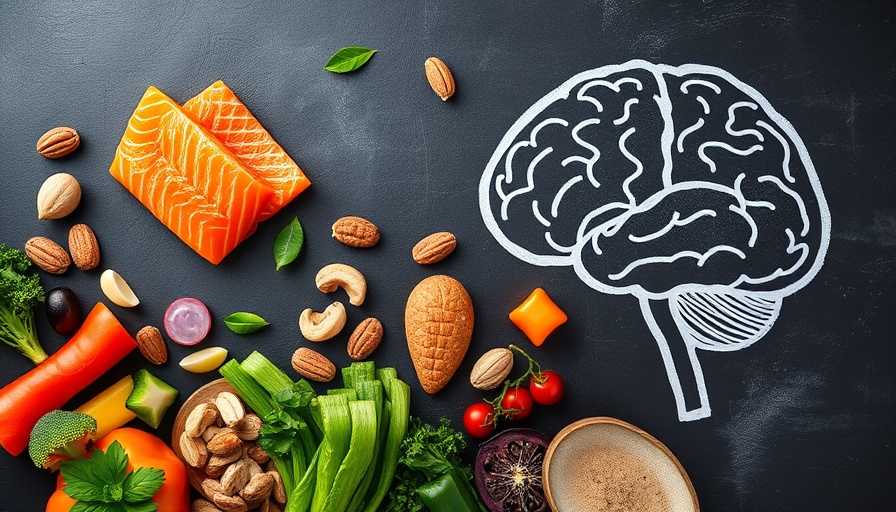
Can Our Dieting Choices Truly Affect Brain Aging?
The quest to maintain mental agility and stave off age-related cognitive decline is one that resonates deeply, especially for men aged 35 to 55 who are keen on fitness and overall well-being. With an increasing number of studies suggesting a close link between diet and brain health, the question arises: can simply altering our diet genuinely slow brain aging? Recent discussions in the scientific community assert that, while diet is essential, evidence supporting this notion remains inconclusive.
The Undeniable Connection: Nutrition and Brain Health
Nutrition undoubtedly plays a crucial role in our overall health. According to neuroscientists, an imbalanced diet may affect cognitive processes and mood stability, even decades before we notice any serious decline. Foods rich in antioxidants, omega-3 fatty acids, and vitamins B and E can support brain function and reduce inflammation, factors that, when ignored, might accelerate mental aging. However, to what extent can diet alone be considered a protective measure against cognitive decline? Researchers suggest that while there is some correlation, concrete evidence linking diet adjustments exclusively to slowed brain aging is still in its infancy.
Distinguishing Between Correlation and Causation
When examining whether dietary changes can prevent cognitive decline, it is important to navigate the fine line between correlation and causation. Many factors contribute to brain health, including genetics, physical activity, and social interaction. A study conducted at a leading university showed that older adults who maintained a balanced diet rich in fruits, vegetables, and lean proteins did score better on cognitive tests over time. Yet, the same study did not underlyingly prove that diet alone was responsible for these positive results. It's possible that those who invest in healthy eating habits also engage in more physical activity or have stronger social networks, both of which are vital for cognitive health.
A Closer Look at Popular Diets Promoted for Brain Health
In the ever-evolving landscape of health trends, some diets have emerged specifically on the premise of enhancing brain function. The Mediterranean diet, for instance, emphasizes whole grains, healthy fats, and plenty of fruits and vegetables. Research showed participants adhering to this diet had better cognitive performance. Interestingly, while advocates claim its powerful ability to protect against memory loss, it importantly works best when coupled with other healthy lifestyle choices like exercise and mental stimulation. Therefore, while such diets can be beneficial, it is essential to adopt a holistic approach.
Empowering Choices: Actions You Can Take Today
With all this evidence swirling around, how can you, as a busy professional or fitness enthusiast, translate this information into actionable changes? Here are three steps to take control of your nutrition and cognitive health:
- Prioritize Whole Foods: Aim for a balanced plate that includes a variety of fruits, vegetables, lean proteins, and whole grains.
- Stay Hydrated: Dehydration can impact cognitive function, so ensure adequate water intake throughout the day.
- Consider Supplements Mindfully: Consult a healthcare professional about adding omega-3 fatty acids or essential vitamins to support your diet.
Ratios of Hope: The Future of Brain Health Research
Looking ahead, the relationship between diet and brain aging will likely continue to be a hot topic of research. Scientists are now exploring in-depth studies to unravel the intricate relationship between the microbiome and cognitive health, which may shed light on new dietary recommendations to potentially improve brain function. The concept of preventative health care is gaining traction, creating hope that further validated and specific dietary guidelines may one day be established.
Don't Underestimate the Importance of Holistic Wellness
As we forge into an age where health and longevity are at the forefront of our societal narrative, it’s crucial to foster an integrated lifestyle that transcends beyond strictly diet. Remember, a community of supportive friends, regular exercise, and mental health practices plays an equally pivotal role in safeguarding our cognitive functions. Let’s take the initiative to educate ourselves and become advocates for holistic health—because every step taken counts toward a sharper, healthier future.
 Add Row
Add Row  Add
Add 




Write A Comment